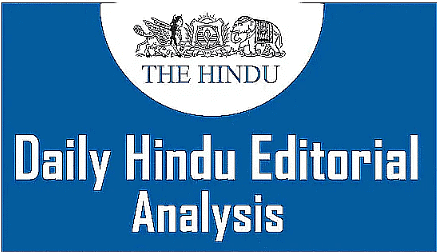UPSC Exam > UPSC Notes > Current Affairs & Hindu Analysis: Daily, Weekly & Monthly > The Hindu Editorial Analysis - 15th June 2023
The Hindu Editorial Analysis - 15th June 2023 | Current Affairs & Hindu Analysis: Daily, Weekly & Monthly - UPSC PDF Download

The next Finance Commission will have a tough task
Why in News?
The government will appoint a Finance Commission in the next few months to determine how much of the Centre’s tax revenue should be given away to States (the vertical share) and how to distribute that among States (the horizontal sharing formula).
About Finance Commission of India
- President Constitutes the Finance Commission every 5 years or at such time he considers necessary.
- The constitution authorizes the parliament to determine the qualification of the members of the commission. Parliament is also authorized to determine the manner in which they should be selected.
- So the parliament prescribed that the appointment of the Chairman and the other members of the commission shall be done by the President.
- Moreover, the members of the Finance Commission are eligible for reappointment.
- However, it is important to consider that the recommendations made by the commission are only advisory in nature hence not binding on the government.
Composition of Finance Commission
The Finance Commission is a 5 member body that must have:
- A Chairman;
- Four Other Members.
Key Provisions related to the composition of FC
The Chairman of the Finance Commission must be a person having experience in public affairs. The other 4 members must be:
- A high Court Judge or one qualified to be appointed as such;
- A person with special knowledge of the finances and accounts of the government;
- A person with wide experience in financial matters and administration;
- A person with special knowledge of economics.
Duty of the Commission
- The duty of the commission is to make recommendations to the president as to:
- About the distribution of net proceeds of the taxes between the Union and the States or between the states of the respective shares of such proceeds.
- About the manner which should govern the grants-in-aid of the revenues of the states out of Consolidated Fund of India.
- Regarding the steps required to increase a state’s consolidated fund in order to supplement the resources of the state’s panchayats and muncipalities.
- Any other matter referred to the Finance Commission by the President. The Commission submits its report to the President who lays it before both houses of the parliament.
Borrowing Power of the Union
- The Union shall have the unlimited power of borrowing either within India or outside upon the security of revenues of India.
- But the limit to exercise such power of the Union is fixed by parliament from time to time (article 292).
Borrowing Power of the States
The borrowing power of the state is subject to a number of constitutional limitations:
- The state cannot borrow outside India.
- The state executive shall have to power to borrow within the territory of India upon the security of revenues of the states. Such borrowings are subject to certain limitations:
- Any limitations imposed by the State Legislature.
- In case, Union has guaranteed an outstanding load of the State, the state cannot raise a fresh loan without the consent of the Union Government.
- The Union Government may offer a loan to a State, under a law made by the parliament.
Financial Control by the Union in Case of Emergencies
- The normal financial matters between the Centre and the States are subject to be modified in different cases of emergencies.
- Article 354: When the proclamation of emergency [Article 352(1)] is in operation, the President can direct that all or any of the provisions related to the division of taxes between the Union and the States and the grant-in-aid shall be suspended. Such order of the President shall not exceed beyond the expiration of the financial year in which the proclamation ceases to operate.
- When the proclamation of Financial Emergency [Article 360 (1)] is made by the President, it shall be competent for the Union to give directions to the states:
- Must adhere to any financial propriety rules and other protective measures that may be specified in the directions;
- To reduce the salary and allowances of all the persons serving under the affairs of the state, including the judges of the High Court;
- To reserve all money bills and financial bills for the consideration of the President, after getting passed by the legislature of the state.
List of Finance Commission
Finance Commission | Chairperson | Important Recommendations |
1st Finance Commission | Sri Niyogi |
|
2nd Finance Commission | Sri Santhanam | – |
3rd Finance Commission | A.K. Chanda | – |
4th Finance Commission | Dr. Rajmannar | – |
5th Finance Commission | Sri Mahavir Tyagi |
|
6th Finance Commission | Sri Bahmananda Reddy |
|
7th Finance Commission | Sri Shelat |
|
8th Finance Commission | Sri Y.B. Chavan | – |
9th Finance Commission | Sri NKP Salve | – |
10th Finance Commission | Sri K.C. Pant | – |
11th Finance Commission | A.M. Khurso | – |
12th Finance Commission | Dr. C. Rangarajan | – |
13th Finance Commission | Shri Vijay Kelkar | – |
14th Finance Commission |
| |
15th Finance Commission | Shri N.K. Singh |
|
The document The Hindu Editorial Analysis - 15th June 2023 | Current Affairs & Hindu Analysis: Daily, Weekly & Monthly - UPSC is a part of the UPSC Course Current Affairs & Hindu Analysis: Daily, Weekly & Monthly.
All you need of UPSC at this link: UPSC
|
38 videos|5288 docs|1117 tests
|
Related Searches
















